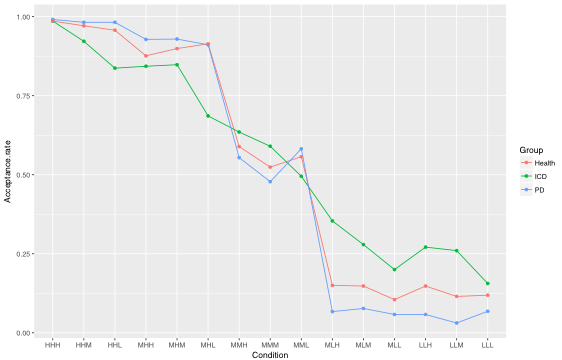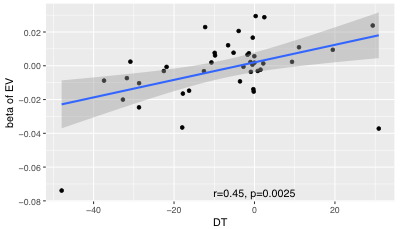Session Information
Date: Monday, October 8, 2018
Session Title: Parkinson's Disease: Non-Motor Symptoms
Session Time: 1:15pm-2:45pm
Location: Hall 3FG
Objective: We aim to develop a tool lack of stigma to detect patients’ impulse control problems.
Background: Dopaminergic medication is current major treatment for Parkinson’s disease (PD). Recent studies suggest dopaminergic stimulation may cause impulse control disorder (ICD). ICD symptoms including pathological gambling or hypersexuality often induced huge patients’ psychosocial stress. However, patients tend to hide those symptoms because of shame and guilty feeling. Lottery choice task (LCT) was previously used in functional MRI study to evaluate brain activity in different age subjects. The results indicated aging subjects tend to be risk takers possibly due to neurodegeneration. We supposed this task is also sensitive to detect ICD.
Methods: We collected 14 PD patients with previous history of developing ICD (pathological gambling), 15 PD patients without ICD and 14 healthy controls. Our PD patients with pathological gambling were all received medical adjustment for reducing ICD symptoms. None of the participants had cognitive impairment. PD severity, Age, gender and education years were all matched. All participants performed LCT while receiving 3T MRI scan. During the task, all participants were asked to maximize their total accumulated points by deciding whether to accept the offered stakes with different expected values, which were composed of varied risks and rewards. We calculated decision threshold (DT) as the summary of each patient’s task result, which could indicate the patient’s behavior.
Results: Our results showed the ICD group had significantly higher rate to accept the stakes with rewards of high value but low probability of winning compared with the other 2 groups. fMRI LCT showed there were different activities toward expected value among 3 groups: PD patients had the highest neural sensitivities to expected values in right middle frontal and inferior temporal lobes, and ICD patients had the lowest sensitivities. DT showed positive correlated with neural sensitivities to expected values.
Conclusions: Our results revealed PD patients with ICD tend to accept high risk choice due to lack of judgment on expected value. LCT showed the behavior change in ICD patients even they had little symptoms after adjusting medication. fMRI supported alternation of frontal and temporal activities. We supposed LCT might be a good detect tool for ICD.
References: 1. Napier TC, Corvol JC, Grace AA, et al. Linking neuroscience with modern concepts of impulse control disorders in Parkinson’s disease. Movement disorders : official journal of the Movement Disorder Society 2015;30:141-149. 2. Weintraub D, Koester J, Potenza MN, et al. Impulse control disorders in Parkinson disease: a cross-sectional study of 3090 patients. Archives of neurology 2010;67:589-595. 3. Barns Neurauter MP, Rickards H, Cavanna AE. The prevalence and clinical characteristics of pathological gambling in Parkinson’s disease: an evidence-based review. Functional neurology 2010;25:9-13. 4. O’Callaghan C, Hornberger M. Screening for impulse control symptoms in patients with de novo Parkinson disease: a case-control study. Neurology 2013;81:694-695. 5. Goto Y, Grace AA. Limbic and cortical information processing in the nucleus accumbens. Trends in neurosciences 2008;31:552-558. 6. Voon V, Gao J, Brezing C, et al. Dopamine agonists and risk: impulse control disorders in Parkinson’s; disease. Brain 2011;134:1438-1446. 7. Rao H, Mamikonyan E, Detre JA, et al. Decreased ventral striatal activity with impulse control disorders in Parkinson’s disease. Movement disorders : official journal of the Movement Disorder Society 2010;25:1660-1669. 8. Claassen DO, Stark AJ, Spears CA, et al. Mesocorticolimbic hemodynamic response in Parkinson’s disease patients with compulsive behaviors. Movement disorders : official journal of the Movement Disorder Society 2017;32:1574-1583. 9. Goh JO, Su YS, Tang YJ, et al. Frontal, Striatal, and Medial Temporal Sensitivity to Value Distinguishes Risk-Taking from Risk-Aversive Older Adults during Decision Making. The Journal of neuroscience : the official journal of the Society for Neuroscience 2016;36:12498-12509. 10. Christenson GA, Faber RJ, de Zwaan M, et al. Compulsive buying: descriptive characteristics and psychiatric comorbidity. The Journal of clinical psychiatry 1994;55:5-11. 11. Beck AT, ; Steer, R. A.; Brown, G. K. Beck Depression Inventory: second edition manual: San Antonio (TX): The Psychological Corporation, 1996. 12. Patton JH, Stanford MS, Barratt ES. Factor structure of the Barratt impulsiveness scale. J Clin Psychol 1995;51:768-774. 13. Stanford MS, Mathias CW, Dougherty DM, Lake SL, Anderson NE, Patton JH. Fifty years of the Barratt Impulsiveness Scale: An update and review. Personality and Individual Differences 2009;47:385-395. 14. Yao S, Yang H, Zhu X, et al. An Examination of the Psychometric Properties of the Chinese Version of the Barratt Impulsiveness Scale, 11th Version in a Sample of Chinese Adolescents. Perceptual and Motor Skills 2007;104:1169-1182. 15. Brett M, Anton JL, Valabrgue R, Poline J-B. Region of interest analysis using an SPM toolbox. Presented at the 8th International Conference on Functional Mapping of the Human Brain, June 2-6, 2002, Sendai, Japan. 16. Bastiaens J, Dorfman BJ, Christos PJ, Nirenberg MJ. Prospective cohort study of impulse control disorders in Parkinson’s disease. Movement disorders : official journal of the Movement Disorder Society 2013;28:327-333. 17. Dodd ML, Klos KJ, Bower JH, Geda YE, Josephs KA, Ahlskog JE. Pathological gambling caused by drugs used to treat Parkinson disease. Archives of neurology 2005;62:1377-1381. 18. Joutsa J, Martikainen K, Vahlberg T, Voon V, Kaasinen V. Impulse control disorders and depression in Finnish patients with Parkinson’s disease. Parkinsonism Relat Disord 2012;18:155-160. 19. Pontone G, Williams JR, Bassett SS, Marsh L. Clinical features associated with impulse control disorders in Parkinson disease. Neurology 2006;67:1258-1261. 20. Mayberg HS, Starkstein SE, Sadzot B, et al. Selective hypometabolism in the inferior frontal lobe in depressed patients with Parkinson’s disease. Annals of Neurology 1990;28:57-64. 21. Marc J. Mentis, Anthony R. McIntosh, Kenneth Perrine, et al. Relationships Among the Metabolic Patterns That Correlate With Mnemonic, Visuospatial, and Mood Symptoms in Parkinson’s Disease. American Journal of Psychiatry 2002;159:746-754. 22. Cardoso EF, Maia FM, Fregni F, et al. Depression in Parkinson’s disease: Convergence from voxel-based morphometry and functional magnetic resonance imaging in the limbic thalamus. NeuroImage 2009;47:467-472. 23. Wen X, Wu X, Liu J, Li K, Yao L. Abnormal Baseline Brain Activity in Non-Depressed Parkinson’s Disease and Depressed Parkinson’s Disease: A Resting-State Functional Magnetic Resonance Imaging Study. PLoS ONE 2013;8:e63691. 24. Timmer MHM, Sescousse G, van der Schaaf ME, Esselink RAJ, Cools R. Reward learning deficits in Parkinson’s disease depend on depression. Psychological Medicine 2017;47:2302-2311. 25. Voon V, Thomsen T, Miyasaki JM, et al. Factors associated with dopaminergic drug-related pathological gambling in parkinson disease. Archives of neurology 2007;64:212-216. 26. Ding WN, Sun JH, Sun YW, et al. Trait impulsivity and impaired prefrontal impulse inhibition function in adolescents with internet gaming addiction revealed by a Go/No-Go fMRI study. Behavioral and brain functions : BBF 2014;10:20. 27. Claassen DO, van den Wildenberg WPM, Ridderinkhof KR, et al. The Risky Business of Dopamine Agonists in Parkinson Disease and Impulse Control Disorders. Behavioral neuroscience 2011;125:492-500. 28. van Eimeren T, Ballanger B, Pellecchia G, Miyasaki JM, Lang AE, Strafella AP. Dopamine Agonists Diminish Value Sensitivity of the Orbitofrontal Cortex: A Trigger for Pathological Gambling in Parkinson’s Disease? Neuropsychopharmacology 2009;34:2758. 29. van Eimeren T, Pellecchia G, Cilia R, et al. Drug-induced deactivation of inhibitory networks predicts pathological gambling in PD. Neurology 2010;75:1711.
To cite this abstract in AMA style:
W. Liu, R. Wu, J. Goh. Lottery choice task as a detect tool for PD patients with pathological gambling [abstract]. Mov Disord. 2018; 33 (suppl 2). https://www.mdsabstracts.org/abstract/lottery-choice-task-as-a-detect-tool-for-pd-patients-with-pathological-gambling/. Accessed December 25, 2025.« Back to 2018 International Congress
MDS Abstracts - https://www.mdsabstracts.org/abstract/lottery-choice-task-as-a-detect-tool-for-pd-patients-with-pathological-gambling/



